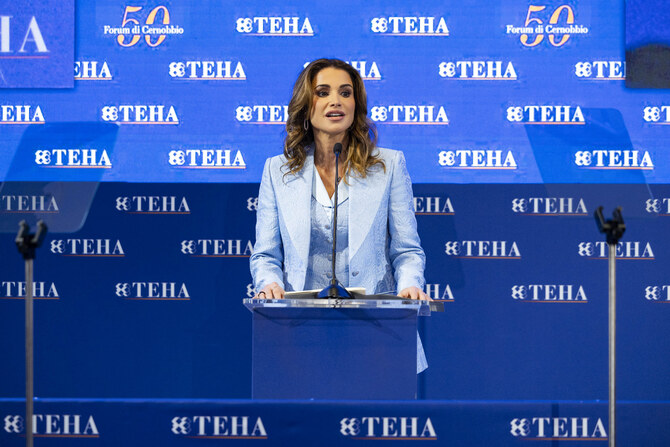LONDON: Jordan’s Queen Rania on Saturday criticized what she described as Western “double standards” regarding the war in Gaza, which she said are contributing to a “loss of faith in the rules and moral standards meant to govern our world.”
Speaking at the 50th European House Ambrosetti Forum, an annual economic conference in Cernobbio, Italy, the queen said that in the aftermath of global wars and other bloody conflicts in Europe during the 20th century the international community established a number of global institutions with the aim of preventing similar violence.
“The people of the world deserve a global system they can trust, free of prejudice, moral loopholes and deadly blind spots. And trust in that system has become intrinsically tied to the fate of the Palestinian people,” she said as she urged European countries to weigh their responses to the conflict in Gaza against their proclaimed values.
“From the United Nations to the International Court of Justice to the UN Declaration of Human Rights, the world came together to establish norms for a future better than its past, a future based on the values of the UN Charter: peace, justice and human rights,” she said.
However, many people around the world are struggling to maintain their belief in the integrity and impartiality of these norms, Queen Rania added.
“Looking at Israel’s war in Gaza, they see a glaring double standard or, worse yet, a seeming abdication of any standards at all,” she said.
Over the past 11 months, the Gaza Strip had been hit by an estimated 70,000 tonnes of bombs, the queen continued, which is “more than all bombs dropped on London, Hamburg and Dresden throughout all of the Second World War.”
She noted that almost the entire population of Gaza is facing acute food insecurity, and denounced Israeli obstruction of humanitarian aid deliveries while Palestinian children are starving.
She also highlighted other ways in which the war is taking a high toll on Gaza’s children, pointing out that the conflict has resulted in more child amputees than any other.
“Doctors describe the horror of amputating on children too young to walk,” Queen Rania said. “According to Save the Children, over 20,000 children are estimated to be lost, detained, buried under the rubble or in mass graves.”
She said it has been nearly eight months since the highest court in the world, the International Court of Justice, ruled it was “plausible” that Israel is committing acts of genocide in Gaza, and noted that authorities in the country also recently launched a wide-ranging military assault on the West Bank.
“For decades, beginning before last October, Palestinians have been subjected to a crushing, criminal occupation,” she said. “Palestinians, too, have the right to live in security and peace. And yet, here we are, still.
“Is the world saying that Israel’s security is more important than anyone else’s and, therefore, nothing is off-limits in its pursuit? That no level of Palestinian suffering is too high a price to pay?
“This devaluation of life must be called out for what it is: anti-Palestinian racism. This failure cannot stand.”
The queen said that Europe has long positioned itself as a champion of international law and human rights, adding: “What is the Global South supposed to think when they see the West stand up for the people of Ukraine while leaving innocent civilians in Gaza to unprecedented collective punishment? What conclusions are people to draw about who matters, who doesn’t, and why?
“More than hypocritical, the double standard is dehumanizing. It is cruel. And if it isn’t racist, I don’t know what is. That’s why rejecting double standards, demanding accountability, and finding a common path to peace are necessary to create the future that Palestinians, Israelis and all of us deserve.”
Queen Rania went on to highlight a number of basic, “indisputable” principles that could provide a shared foundation for the warring parties to build on, and which must be upheld to achieve a mutual, sustainable peace.
They included the respect for international law and basic human rights, the countering of extremist voices in debates surrounding Israel and Palestine, and the need to ensure human dignity at all times.
The conference in Cernobbio brought together Italian and international decision-makers to examine and discuss geopolitical, economic, technological and social scenarios.
Other officials and heads of state that participated included Italian Prime Minister Georgia Meloni, Azerbaijan’s President Ilham Aliyev, and Vice President of the European Commission Josep Borrell.














